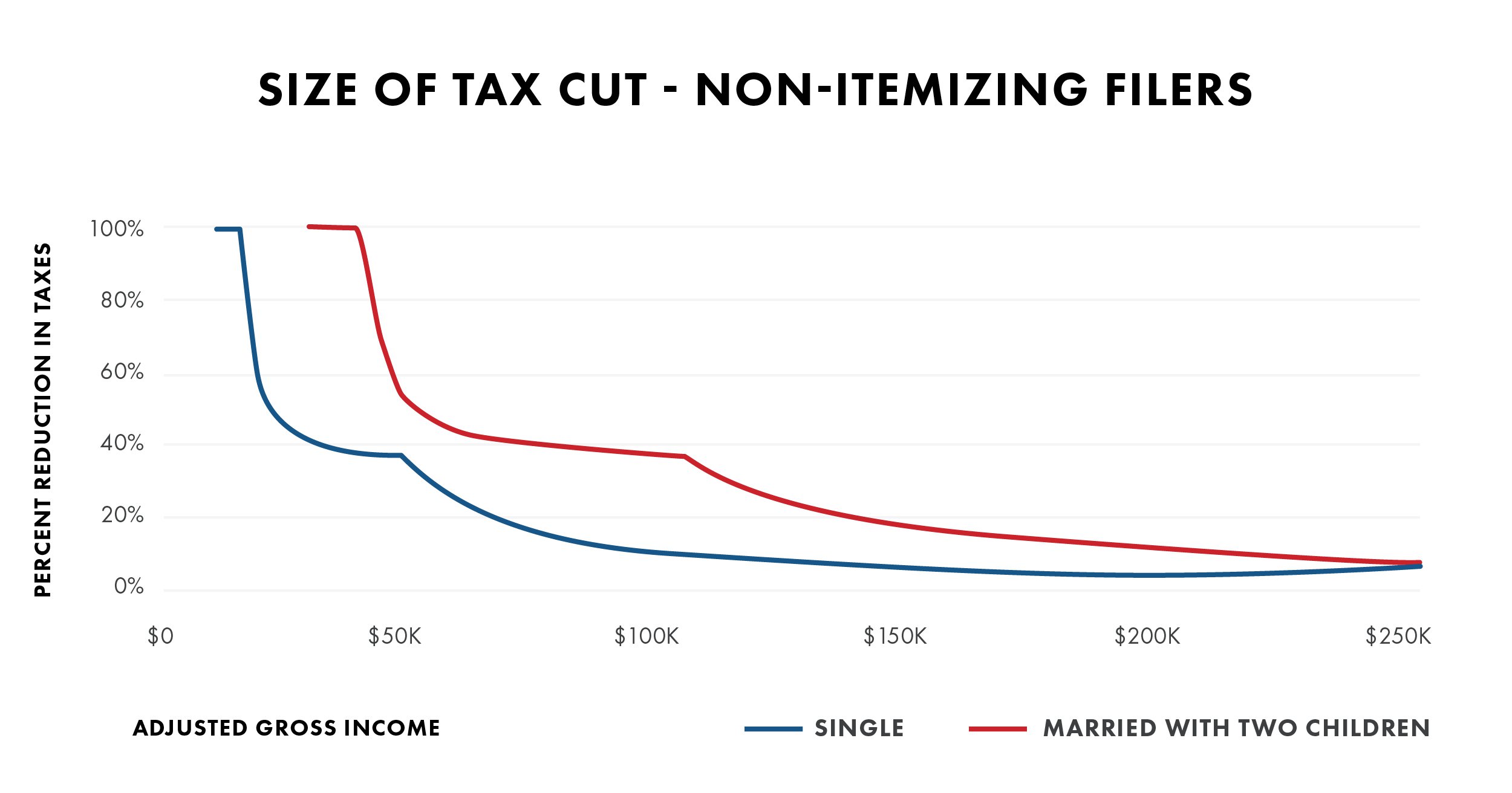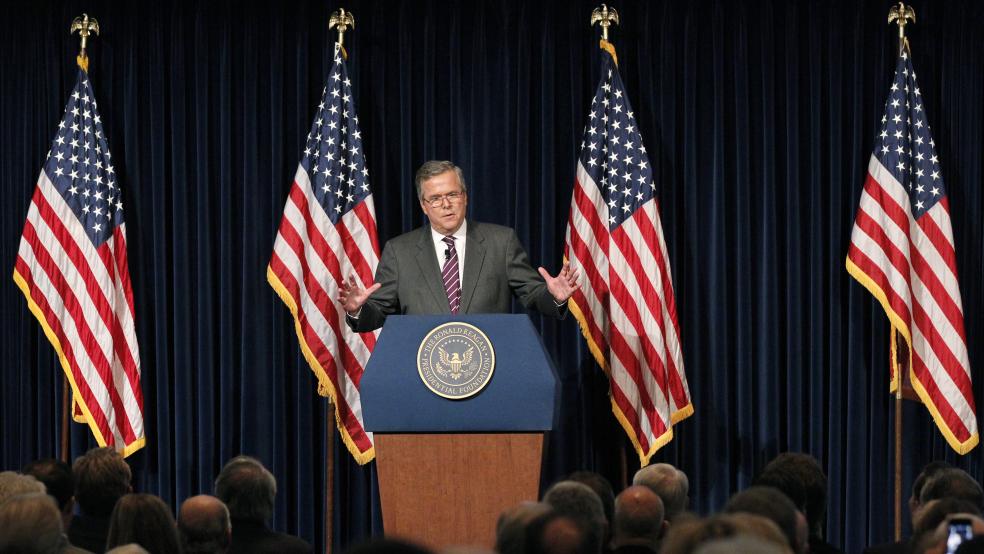A major tax reform proposal from Jeb Bush is fast becoming a Rorschach test for analysts from both ends of the political spectrum.
The Wall Street Journal’s editorial page hailed it as a pro-growth blueprint that would give the economy a “huge lift.” Budget hawks warned that the proposed deep cuts in corporate and individual tax rates would drain the Treasury and add between $1.2 trillion and $3.4 trillion to the national debt over the coming decade.
Related: Can Jeb Bush, Bernie Sanders or Joe Biden Get a Colbert Bump?
Liberal Democrats have largely come out against the plan as a sop to the rich much like Mitt Romney’s 2012 tax plan, with a revised tax code that would provide the biggest financial benefit to the wealthiest cohort of Americans on a percentage basis. “Just as he did in Florida, Bush is embracing a disastrous economic agenda that benefits himself, and those like himself, while leaving the middle class out to dry,” Holly Shulman, a spokesperson for the Democratic National Committee, told The Washington Post on Wednesday.
In fact, Bush and his economic advisers have designed arguably the most detailed and comprehensive approach to tax reform of any of the Republican and Democratic candidates. And it seeks to blend traditional supply-side faith in the economic power of a tax cut with more populist views on the importance of eliminating overly generous tax deductions and special treatment of Wall Street investment income.

In announcing his campaign in June, Bush promised to make 4 percent annual economic growth the new norm in the United States, something that many economists dismissed as pie in the sky in the face of recent trends.
However, a study by the non-partisan Tax Foundation issued on Thursday concluded that Bush’s plan for consolidating and slashing tax rates for individuals and businesses would, indeed, provide a substantial boost to the economy over the coming decade – driving up wages and creating millions of new jobs.
Related: Republican Jeb Bush to propose personal, corporate tax cuts
According to the organization’s projections, Bush’s proposed reforms would increase the GDP by 10 percent above the current baseline over the next 10 years. Wages would rise by 7.4 percent over the coming decade. And the economy would generate 2.7 million more jobs than it would under current government policy.
Tax Foundation analysts say that Bush’s plan would provide tax relief for every income group, although the benefit on a percentage basis would favor richer Americans. According to a table measuring the after-tax benefits of the proposed tax cuts, the wealthiest top 10 percent of Americans would enjoy a 4.7 percent to 11.6 percent benefit in terms of reduced taxation, compared to a 1 percent to 3 percent benefit for low and middle-income Americans.
Depending on the economic assumptions used in calculating the long term cost, the report said that the tax cuts could drain the Treasury of between $1.6 trillion and $3.6 trillion over the coming decade. Bush and his economic advisers are counting on his tax cuts to bolster the economy, thereby generating more tax revenue to offset the overall cost of the plan. However, economists are divided over whether the government should count on such rosy scenarios or “dynamic scoring” in gauging the long-term cost of a tax plan.
Bush’s plan also adopts an idea already endorsed by Republican presidential frontrunner Donald Trump and Democratic frontrunner Hillary Rodham Clinton to repeal a substantial loophole for managers of hedge funds and private equity investments known as “carried interest.” That provision has allowed investors to avoid paying billions of dollars in taxes by treating their income as capital gains instead of as salaries, which are taxed at a much higher rate.
Related: What 33 Years of Tax Returns Reveal About Jeb Bush
“These changes would greatly increase the U.S. economy’s size in the long run, leading to higher incomes for taxpayers at all income levels,” the Tax Foundation report concludes. “The plan would also be a large tax cut, which would increase the federal government’s deficit both on a static and dynamic basis.
Here is a summary of other key provisions:
- The federal tax codes current seven brackets would be consolidated into three, with reductions in the top marginal tax rates from more than 40 percent to 28 percent for individuals and from 35 percent to 20 percent for corporations.
- The standard deductions would be increased from $6,300 to $11,300 for single filers; from $12,600 to $22,600 for married couples and from $9,250 to $15,750 for heads of households. The personal exemption would be preserved at $4,000.
- In exchange for slashing tax rates, the Bush plan would limit deductions to 2 percent of adjusted gross income while doing away with many popular loopholes – including the federal tax write-off of state and local taxes. However, charitable deduction would be kept.
- It would adopt a “territorial” tax system that would allow multi-national corporations to pay taxes in the foreign country where their income is earned. However, they would have to pay a one-time 8.75 percent tax on the estimated $2.1 trillion of income that those companies currently are sheltering overseas, spread out over the coming decade.
- All capital investments, including inventories, would be fully deductible in the year they are purchased.
- The corporate Alternative Minimum Tax would be eliminated.
- Interest expense write offs would be eliminated.
- The estate tax would be eliminated.
During an appearance at a North Carolina factory yesterday, Bush called the current federal tax code a “disaster.” He promised that his plan would work well “whether you’re on Main Street or Wall Street – no special favors, no special breaks,” according to media reports.
Related: Why Jeb Bush Won’t Follow the Herd on Taxes
Striking a populist tone at a time when candidates of both parties are voicing concern about widespread income inequality in the country, Bush said his plan would “help those who live on their paychecks, who haven’t seen a raise in a while.”





